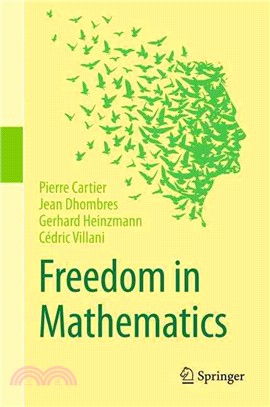Freedom in Mathematics
商品資訊
ISBN13:9788132227861
出版社:Springer Verlag
作者:Pierre Cartier; Jean Dhombres; Gerhard Heinzmann; C撊崁ic Villani
出版日:2016/05/09
裝訂:精裝
規格:23.5cm*15.5cm (高/寬)
商品簡介
The book confronts the points of view of two mathematicians: Pierre Cartier who is one of the pillars of the famous Bourbaki group and Cedric Villani, one of the most brilliant of his generation, who received the Fields Medal in 2010. Mathematician and historian of science Jean Dhombres and philosopher of science Gerhard Heinzmann, both specialists in mathematics, engage in a fruitful dialogue with the two mathematicians, likely to lead the reader to reflect on mathematical activity and its social consequences in mankind’s history as well as in the modern world. Cedric Villani’s popular success proves once again that common awareness has assimilated, even if in a very confused way, the major role of mathematics in the construction and efficiency of natural sciences that are at the origin of our technologies. Notwithstanding this, the idea that mathematics cannot be shared remains entrenched, and even branded as a lack of culture laid claim to by some in the media, cultural and political establishment.
These authors explore three major directions in their dialogue. The very complex relationship between mathematics and reality, a subject of many debates and opposing viewpoints. The freedom that the construction of mathematics has given man by enabling him to develop natural sciences, as well as that needed by mathematicians to develop their research. The responsibility with which the scientific community and governments should address the issue of the role of mathematics in research or education policies.
作者簡介
PIERRE CARTIER is academic by training, emeritus research director at the Centre national de la recherche scientifique (CNRS), and research scientist and a visitor (for indeterminate term) at the Institut des Hautes Etudes Scientifiques(IHES) of Bures-sur-Yvette. He is currently emeritus research director at the University Paris-Diderot. He is former member of the Bourbaki group. Born in 1932 in Sedan, Professor Carier, despite his provincial background, followed the path of excellence in his studies: a secondary school in his home town, followed by the lycee Saint-Louisin Paris and then the Ecole normale superieure, and he obtained an advanced teaching degree and a doctorate in mathematics (1958). He also went to Princeton for two years; there he became acquainted with legendary figures such as Robert Oppenheimer and Andre Weil (brother of philosopher Simone Weil). Last but not least, he carried out a long military service in the marine corps against the backdrop of the Algerian war. He was then professor at the University of Strasbourg from 1961 to 1971. The years 1950–1975 were the hey-day of the Bourbaki group, of which he is one of the pillars; there he became friends with famous people like Cartan, Schwartz, Dieudonne, Chevalley, Weil, and with younger ones.
A “mathematician without borders”, Professor Cartier is active within the framework of the cooperation agency of the French Mathematical Society (Cimpa). He had been working in the Paris region since 1971, and he roamed around between Parisian academic institutions: University Paris-Sud, Ecole polytechnique, Ecole normale superieure. He is not a member of the French Academy of Sciences (a voluntary choice). His scientific interests are quite diverse (even eclectic), but centered around group theory and mathematical physics. He often cited thesis relates to algebraic geometry, by he also contributed to differential geometry, number theory, combinatorics, numerical analysis, probability and mathematical physics. He wrote a reference book onFeynman Integrals (in collaboration with C. DeWitt-Morette, Functional Integration, Action and symmetries (Cambridge University Press, 2004). He is also one of the editors ofMathematics in the 21st Century: 6th World Conference, Lahore, March 2013 (Springer, 2014). He has supervised more than 40 doctoral theses, and he continues to work with some of my students on multiple zeta values and the Galois theory of differential equations.
JEAN DHOMBRES is mathematician and historian of science, emeritus CNRS research director, director of studies at the Alexandre Koyre Centre of the Ecole des hautesetudes en sciences sociales (EHESS), specialist of the mathematics of functional equations and of their applications, of epistemology of mathematics, and of the history of scientific communities and of the spread of scholarly ideas. Born in Paris in 1942, he studied at the Ecole polytechnique and chose to take a chance with mathematical research instead of graduating as an engineer. He worked in functional analysis and through a series of encounters, he joined a small international group of scientists focused on functional equations. In fact it was in Bangkok that his first book was published as a result of a talk he had given at Chulalongkorn University in 1971. Besides many articles, he is happy to have been able to work with Janos Aczael, the uncontested leader in this field, having published with him a book on the subject, which has now become a reference, in Encyclopaedia of mathematics (University of Cambridge Press, republished in 2008).
Probably as a reaction to his family background, as well as to a scientific training centered on France, he wished to see the world, by learning Chinese, by participating in the establishment of experimental classes in Wu Han in China, then by becoming scientific adviser in a French embassy for three years. He became professor at the University of Nantes as early as 1972. Since for a while he was head of its mathematics department, he was confronted with issues related to teaching and continuing education of high school teachers. Setting up a mathematics education research Institute in Nantes led him to think that getting involved in the history of mathematics would enable him to identify interesting pedagogical methods. This activity has become a major interest and led to the establishment of the Francois Vi`ete Centre in Nantes. He was elected as a director of studies at the Ecole des hautes etudes en sciences sociales(EHESS) in 1988 and to the Chair of History of Exact Sciences. That same year he accepted the position of CNRS research director to run a laboratory devoted to the history of science in Paris, which now falls within the framework of the Alexandre Koyre Centre, feeling somehow the successor of this philosopher, by line of descent from Rene Taton and Pierre Costabel. He thinks historians still need to better account for the representation of mathematics in human societies in order to grasp how these societies function, by learning how to properly benefit from the computer revolution which gives access to all the texts, from the past to the present-day. It is indeed true that current mathematics are often useful to comprehend past mathematics, and that a celebratory tone, or mere erudite accumulation concerning the latter is of no use for us. Emeritus since 2007, he is able to continue to lead a seminar at the EHESS, which in the academic year 2013 was on the question of authority in mathematics. Finally, the Liber amicorumwhich was dedicated to him and which included a list of publications (Reminisciences, Vol. 8, Brepols, 2008), and Une Histoire des savoirs mathematiques et de leurs pratiques culturelles. De l’emancipation a l’age baroque a la moisson des lumieres(Hermann, 2012).
GERHARD HEINZMANN is professor of Philosophy at the University of Lorraine, founder of the History of science and of philosophy laboratory—Archives Henri Poincare (UMR 71117), director of the Maison des sciences de l'hommeof Lorraine (USR 3261). After studying mathematics, philosophy and Greek philosophy in Heidelberg, he specialized in the philosophy of mathematics and logic. A great mathematician and a great philosopher, he trod a path between rationalism, which bases the explanation of the world on reason and empiricism, which draws knowledge from experimentation. He too also uphold this boundary as it does not separate but brings closer. It is for this very reason that he has accepted to run the Maison des sciences de l’homme in Lorraine.
He realised that the pragmatistic and constructive methods used in the philosophy of mathematics to overcome the difficulties faced also stem from or at least resemble the French tradition around Poincare, as well as intellectual circles more or less closely associated to it (Gonseth, Piaget, Cavailles, Beth, Bernays, but also Ajdukiewicz, Brouwer and Weyl). This is especially noticeable if Ludwig Wittgenstein and Nelson Goodman are included as go-betweens for these thinkers and dialogical pragmatism. He decided to institutionalize this connection by having Goodman awarded an honorary doctorate in the framework of the Poincare Archives in 1997. His research focuses mostly on the use of intuitive and formal elements in mathematics and logic. No one contests that intuition is necessary for invention. However, opinions diverge as to the role intuition may be said to play in the process of understanding and justification in mathematics. Some ascribe a fundamental and irreducible role to it, others just want to exclude it. He is looking for an answer to this dilemma in a pragmatic semantics. It is built upon the works of Kuno Lorenz, mathematical realities cannot be conceived independently from their constructions and the latter are not independent from their language description. Instead of considering the construction and the description of objects as two different procedures of mathematical knowledge, they are regarded as two different aspects of the same process of dialogical construction from a common base of actions taking account of their goals and of the given context. This methodical approach allows him not only to build bridges between analytic philosophy and Poincare’s work, but also—and this is the most important—to include political and social aspects in theoretical considerations.
CEDRIC VILLANI, a Fields Medalist in 2010, is mathematician, director of the Henri Poincare Institute (IHP) and professor at the University of Lyon. After entering the Ecole Normale Superieure of Paris, he was glad to find a place of inter-disciplinary scholarship and to discover the intense cultural life of Paris. When writing his thesis, he summarized the influences of Pierre-Louis Lions, Yann Brenier, Eric Carlen, Michel Ledoux; he later found his chosen field in the fusion between analysis, probability and geometry. He worked in analysis when at heart, he was initially an algebraist; his choice of a thesis on the theory of Boltzmann’s equation, when he hardly had the temperament of a physicist; his first collaborations with Italian and German scientists, exploiting ideas put forward during travels or conferences; he shifted towards optimal transport after a series of coincidences and a beautiful talk given by Craig Evans in Paris; then his shift towards geometry at an impromptu meeting with John Lott in Berkeley; and finally his research on Landau damping. Most of his work have been done in collaboration with French, Italian, German, Austrian, Spanish, Swedish, American scientists. His main collaborators were Laurent Desvillettes, Clement Mouhot, Felix Otto, John Lott.He is convinced that teaching is inseparable from research, he has always worked as a university lecturer, and has never applied for a full-time research position. He invested considerable effort in writing reference books and course notes—on optimal transport, measure theory, and kinetic equations. He was formerly the president of the students’ association he belonged to, he is now director of the Henri Poincare Institute, which each year welcomes hundreds of invited scientists from all fields of mathematics and theoretical physics, and from all continents. Outside of mathematics, he spent an equal amount of effort in communicating with society as a whole: forums, radio and television programs, public talks, etc. His first book for a general public, Living Theorem, was published in 2012 (in a literary collection), wherein he described the daily life of a mathematician in the style of a logbook mixing various forms and influences. He is also the president of an association that combines art and technology aimed at the integration of disabled youth, the administrator of a philanthropic initiative in the field of education, the president of a scientific council of a research institute located in Senegal, and the vice-president of an association promoting a federal Europe in the public debate.
主題書展
更多書展今日66折
您曾經瀏覽過的商品
購物須知
外文書商品之書封,為出版社提供之樣本。實際出貨商品,以出版社所提供之現有版本為主。部份書籍,因出版社供應狀況特殊,匯率將依實際狀況做調整。
無庫存之商品,在您完成訂單程序之後,將以空運的方式為你下單調貨。為了縮短等待的時間,建議您將外文書與其他商品分開下單,以獲得最快的取貨速度,平均調貨時間為1~2個月。
為了保護您的權益,「三民網路書店」提供會員七日商品鑑賞期(收到商品為起始日)。
若要辦理退貨,請在商品鑑賞期內寄回,且商品必須是全新狀態與完整包裝(商品、附件、發票、隨貨贈品等)否則恕不接受退貨。
























